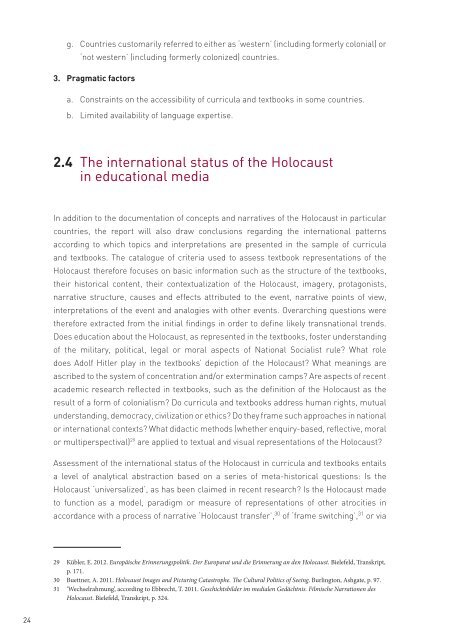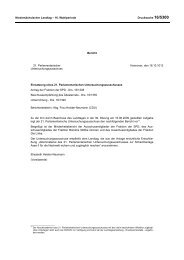228776e
228776e
228776e
Create successful ePaper yourself
Turn your PDF publications into a flip-book with our unique Google optimized e-Paper software.
g. Countries customarily referred to either as ‘western’ (including formerly colonial) or<br />
‘not western’ (including formerly colonized) countries.<br />
3. Pragmatic factors<br />
a. Constraints on the accessibility of curricula and textbooks in some countries.<br />
b. Limited availability of language expertise.<br />
2.4 The international status of the Holocaust<br />
in educational media<br />
In addition to the documentation of concepts and narratives of the Holocaust in particular<br />
countries, the report will also draw conclusions regarding the international patterns<br />
according to which topics and interpretations are presented in the sample of curricula<br />
and textbooks. The catalogue of criteria used to assess textbook representations of the<br />
Holocaust therefore focuses on basic information such as the structure of the textbooks,<br />
their historical content, their contextualization of the Holocaust, imagery, protagonists,<br />
narrative structure, causes and effects attributed to the event, narrative points of view,<br />
interpretations of the event and analogies with other events. Overarching questions were<br />
therefore extracted from the initial findings in order to define likely transnational trends.<br />
Does education about the Holocaust, as represented in the textbooks, foster understanding<br />
of the military, political, legal or moral aspects of National Socialist rule What role<br />
does Adolf Hitler play in the textbooks’ depiction of the Holocaust What meanings are<br />
ascribed to the system of concentration and/or extermination camps Are aspects of recent<br />
academic research reflected in textbooks, such as the definition of the Holocaust as the<br />
result of a form of colonialism Do curricula and textbooks address human rights, mutual<br />
understanding, democracy, civilization or ethics Do they frame such approaches in national<br />
or international contexts What didactic methods (whether enquiry-based, reflective, moral<br />
or multiperspectival) 29 are applied to textual and visual representations of the Holocaust<br />
Assessment of the international status of the Holocaust in curricula and textbooks entails<br />
a level of analytical abstraction based on a series of meta-historical questions: Is the<br />
Holocaust ‘universalized’, as has been claimed in recent research Is the Holocaust made<br />
to function as a model, paradigm or measure of representations of other atrocities in<br />
accordance with a process of narrative ‘Holocaust transfer’, 30 of ‘frame switching’, 31 or via<br />
29 Kübler, E. 2012. Europäische Erinnerungspolitik. Der Europarat und die Erinnerung an den Holocaust. Bielefeld, Transkript,<br />
p. 171.<br />
30 Buettner, A. 2011. Holocaust Images and Picturing Catastrophe. The Cultural Politics of Seeing. Burlington, Ashgate, p. 97.<br />
31 ‘Wechselrahmung’, according to Ebbrecht, T. 2011. Geschichtsbilder im medialen Gedächtnis. Filmische Narrationen des<br />
Holocaust. Bielefeld, Transkript, p. 324.<br />
24




